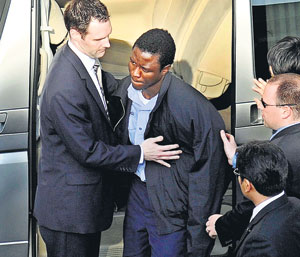
US troops in Japanese crime soupSpate of violent acts sparks renewed protest against American military presence TOKYO (AP) - By all appearances, it was a mindless, brutal crime, a 61-year-old taxi driver stabbed to death by a customer who apparently quarrelled with him over the fare. This particular murder has another twist. The suspect is a U.S. sailor. On Thursday, Japanese police arrested the 22-year-old crew member from the U.S. naval base in Yokosuka. Though crime involving the 50,000 U.S. troops in Japan is going down, a recent spate of high-profile incidents has renewed an old debate about how to keep U.S. troops here in line. Or, for some, whether they should be here at all.
"As long as there are troops here, there will be a problem with crime," said Emiko Shimamoto, a housewife who joined roughly 6,000 other protesters in a recent demonstration against the American presence in Okinawa. That sentiment has long existed in Okinawa, a far-flung southern archipelago where more than half the U.S. troops are deployed. The taxi-driver murder, which occurred just south of Tokyo, has brought the issue closer to home for many other Japanese. "It's scary that there are dangerous people like that near Tokyo," said Maho Goto, a 15-year-old high school girl. "It's outrageous because the U.S. servicemen are supposed to be here to defend us, not to commit crimes." The current wave of concern started in February following a rape allegation in Okinawa. The Japanese police have since dropped the case, reportedly because the girl decided she did not want to testify. Marine Staff Sgt. Tyrone Hadnott allegedly took the 14-year-old girl to his house after offering her a ride home. When she started crying, he said he would drive her home but then, the girl claimed, he raped her in a car."This kind of act by one of our military members, a Marine staff sergeant, is absolutely unacceptable and in no way matches the commitment of our entire U.S. Forces to the highest possible moral and professional standards," said Lt. Gen. Bruce Wright, then the top U.S. military official in Japan. The case, which revived memories of a 1995 rape, received daily coverage in the media and was followed in rapid succession by allegations of Marine involvement in a gang-rape in Hiroshima late last year and then by the taxi-driver murder. The military's reaction has been stern. Rear Adm. James Kelly, commander of U.S. Naval Forces in Japan, announced restrictions this week on drinking off-base for sailors at Yokosuka. On Okinawa, Lt. Gen. Richard Zilmer quickly ordered leadership and cultural awareness training, imposed a strict curfew and virtually banned nonessential off-base activities for all 52,000 troops, civilian employees and their dependents. Hadnott, whose hometown has not been disclosed, remains in a military brig, and his case is still under investigation by U.S. military authorities. The off-base travel ban has since been eased, but the other measures remain largely in place."We're guests here, so one crime is too many," said Lt. Col. Douglas Powell, the top spokesman for the Marines on Okinawa. But he said the Marines believe the recent crimes are an anomaly. "We look at them as isolated incidents," he said. "The Japanese don't see it that way. They see it as a chain of incidents." According to Okinawan police, the number of arrests for felonies or serious misdemeanors by base personnel and dependents fell from 133 in 2003 to 46 in 2006. Powell attributed the decline to a change in attitude and tougher policies cracking down on bad behavior. In particular, off-base drinking has been severely reduced. Many of the changes were the result of public outrage over the 1995 rape, in which three servicemen brutally attacked a 12-year-old girl. The ensuing outcry and other concerns about crime, accidents and overcrowding prompted negotiations with the Japanese government that led to a decision to move 8,000 Marines from Okinawa to the U.S. Pacific territory of Guam by 2012. Some critics claim the military has overreacted this time, trying to squelch bad headlines by meting out punishment to everyone for the misdeeds of a few. For Okinawans, the balance between concerns about crime and the boost the U.S. bases provide to the local economy is a complicated one. |
|
||||||
|| Front
Page | News | Editorial | Columns | Sports | Plus | Financial
Times | International | Mirror | TV
Times | Funday
Times || |
| |
Reproduction of articles permitted when used without any alterations to contents and a link to the source page.
|
© Copyright
2008 | Wijeya
Newspapers Ltd.Colombo. Sri Lanka. All Rights Reserved. |
